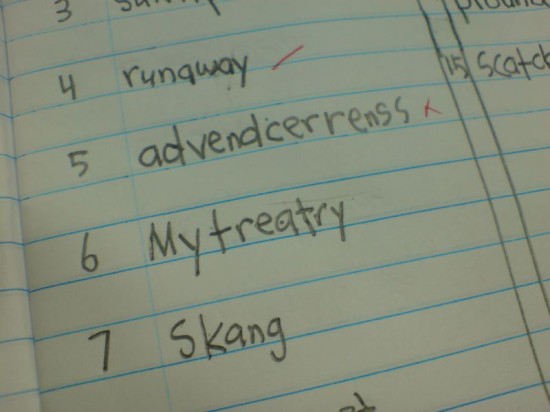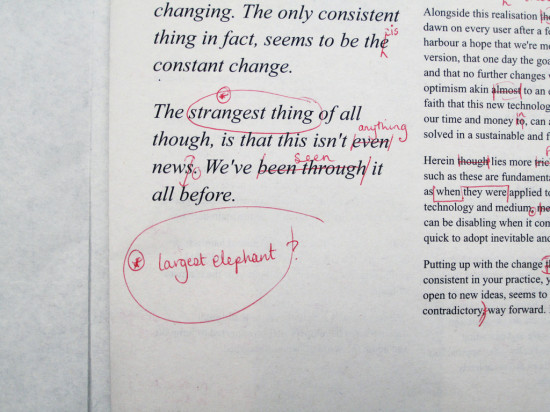Common Misspellings: Words That Are Difficult to Spell

Some words are plain tricky, and even our cousins in the UK (which invented many of the tricky-to-spell words) have similar difficulties. Words that are spelled phonetically present the fewest problems. It’s the ones with strange letter combinations, silent letters and double consonants that are among the most difficult, and it’s hardly surprising that they give people headaches.
An Embarrassment in Spelling
“Embarrassment” with its double r and double s was chosen by British survey participants as the word they found most difficult to spell. I agree that it is an awkward one. I actually keep a list of words I often misspell near my computer, and I have to confess to my “embarrassment” that this word is on the list. Why do I keep a list of words I struggle to spell? So that I can learn them, of course. Everyone should have one.
For those interested, below are the rest of the UK top ten hard to spell words consists of:
- Fluorescent
- Accommodate
- Psychiatrist
- Occasionally
- Necessary
- Questionnaire
- Mischievous
- Rhythm
- Minuscule
I’m happy to say only four of these are on my list, but “necessary” was only taken off it a few years ago. As a spelling exercise for our British brethren, I suggest that they write the following sentences one hundred times without spell-check or autocorrect enabled:
“I occasionally see a psychiatrist about my inability to accommodate the rhythm of necessary chores. If my home were a minuscule bit more organized, I wouldn’t blush fluorescent pink with embarrassment when my mischievous brother comes to visit.”
Admittedly, being Brits, they’d best use the British spelling for “organized.” Although most British people tolerate American spelling well, it infuriates some of them, so if you are British, use an s instead of a z.
Words Americans Struggle Spelling
Google gets asked lots of questions, and it also gets asked how to spell words. The top ten words US Internet users asked google about were:
- Grey
- Cancelled
- Definitely
- Hors d’oeuvres
- Pneumonia
- Appreciate
- Hanukkah
- Restaurant
- Ninety
- Niece
How did you fare with this list? I’m happy to say I only have difficulty with two of them, and hors d’oeuvres was discussed in a recent blog post, so I think I’ll remember how to spell it now.
Based on Google searches, Idaho residents were either the worst spellers or those who were the most concerned about their spelling. Whichever the reason, they asked Google the most spelling based questions.
Google also had a go at working out which words bothered people living in different states most. Some of the results are quite interesting, although what we’re to do with this knowledge remains a mystery.
For example, if you live in Hawaii, not being sure of how to spell “Pterodactyl” keeps you awake at night. On the other hand, residents of Georgia are most worried about how to spell “Pneumonia.” Those living Sunshine State know so little about bad weather that they aren’t sure how to spell “grey.” Then there are Maine residents. They want to let us know they’re fed-up, or so it would seem. Their most googled spelling question was for “frustrated.”
Can Americans Spell “Embarrassed”?
We’re not too unlike the British in our spelling vices. More than 60% of Americans can’t spell the “e-word”. Other words that confuse us include:
- Liaison
- Millennium
- Friend
- Ridiculous
The one thing we can console ourselves with is that everybody has words they’re not confident about spelling. After all, how are we supposed to know the breed of dog that’s pronounced as “Chiwawa” is actually spelled “Chihuahua?” If we were to pronounce that in the way the series of letters suggests, it would be “Chee-who-ah-who-ah”, and that’s exactly how I remember the correct spelling. Somewhere in my head, there’s a little circuit that remembers it in its phonetically pronounced form.
There’s a school of thought saying we should be given leeway to spell things logically. Before the invention of printing and the development of the first dictionaries, there were no real spelling rules. On the other side of the argument, some are pushing for even greater standardization. But since this would mean either the Brits or the Americans would have to give up their form of spelling, it seems unlikely this will ever happen.
As a final consolation, you should know that some of the greatest writers in history were very bad spellers who relied on editors to pick up their errors, so if you struggle to spell certain words, you’re in good company.
(Photo courtesy of elginwx)

